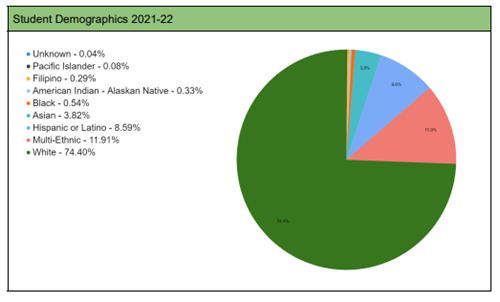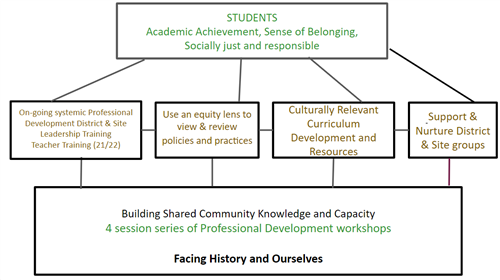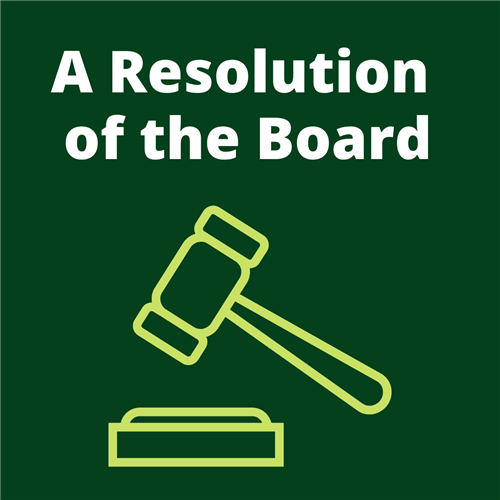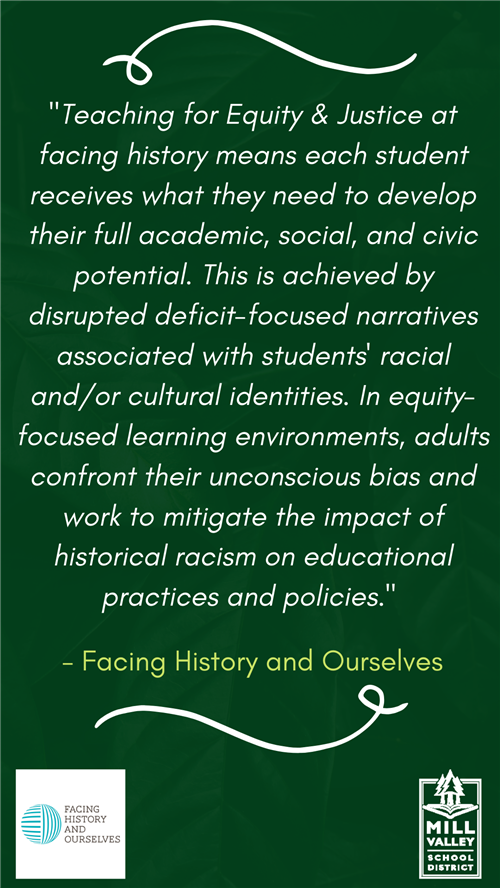- Home
- About us
- Anti-Racism, Diversity, Equity, & Inclusion
- 2020-21 Anti-Racism, Diversity, Equity and Inclusion
Anti-Racism, Diversity, Equity, & Inclusion
Page Navigation
-
Anti-Racism, Diversity, Equity, and Inclusion

During the December 14, 2020 Board Meeting, staff shared an update on the district's work in anti-racism, diversity, equity, and inclusion. You may view our 2020-21 Student Services Year-Long Goals as well. Following on from this work, community and staff workshops on diversity, equity and inclusion (DEI) are being offered and more information on this is available here.
Mill Valley School District Student Demographics
We have a diverse community in some ways; we speak 21 languages throughout our district community; we have students with a variety of needs; we are a district made of up many different learners. However, our district is not very ethnically diverse.

Short-Term Equity Work
- In recent years, equity work has been voluntary.
- Many staff members have participated in Courageous Conversations, including 75 teachers.
- Schools are developing Diversity, Equity, and Inclusion (DEI) groups.
- Some teachers integrating culturally-proficient curriculum and instructional practices.
- Librarians developing special units on the history of voting rights at elementary schools.
- Teachers exploring anti-racist literature for students.
- Teachers completing overhauling units to incorporate anti-racism.
- Group of educators meeting monthly to discuss anti-racist practices, reading Caste, and developing accountability partnerships to examine personal biases and work toward anti-racist teaching practices.
Long-Term Plan
This plan outlines students as the most important constituents of our work. Our goal is to ensure that professional development perpetuates our system of schools that ensures all students have highly-trained staff that has shared understanding. Moving forward, we will be working with Facing History and Ourselves to work toward our goals to impact students directly through their teachers.

This work:
- intentionally focuses on schooling
- is an adult learning journey
- is about shifting educator mindsets and practices
- addresses the centrality of race
- provides a foundational learning experience for educators, families, and community to initiate and sustain equity-centered instructional efforts
The Professional Development Model
Whole schools will engage in a series of trainings called Teaching for Equity and Justice, which consist of 4 consecutive modules that can be done over time or in one 8-hour training.

This work consists of 4 Pillars of Impact:

-
Board Resolution #9 - 20/21 - Anti-Racism, Inclusion, Diversity, and Equity

-
Anti-Racism and Inclusion Discussion Norms
- Stay Engaged
- Speak Your Truth
- Experience Discomfort
- Expect and Accept Non-Closure
-
Committees and Trainings
Teaching for Equity and Justice
The District leadership team is engaging in a four-part "Teaching for Equity and Justice" training with Facing History and Ourselves.
In the course of this series, staff will:- Explore the history of race, schooling, and academic identity to better understand the root causes of present-day educational inequities.
- Engage with contemporary scholarship in the field of race and equity and gain tools to address these historical legacies in your school context.
Our workshop series comprises the following four areas of learning.Session 1 - Tuesday Feb, 2nd - Creating a Learning Space for EquitySession 2 - Tuesday Mar. 16th - Race, Racism and the Historical Roots of Educational InequitySession 3 - April 27th - Bias, Labels, and Shifting Narratives: Cultivating Critical Consciousness of EquitySession 4 - May 18th - Building Educator Efficacy and Student AgencyInstruction, Curriculum, Assessment, and Equity (ICAE) Working Group
All District staff have been invited to participate in this committee to provide feedback for the Local Control and Accountability Plan (LCAP) and Strategic Plan, to develop shared understanding of terms, gather evidence of the connection between teaching and learning practices, to examine the role of agency and ownership in student achievement, and to develop action steps for the 2021-22 school year.


